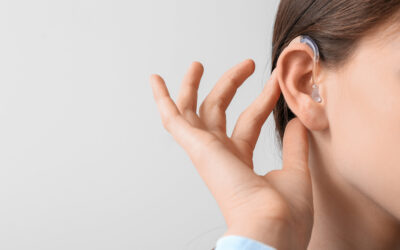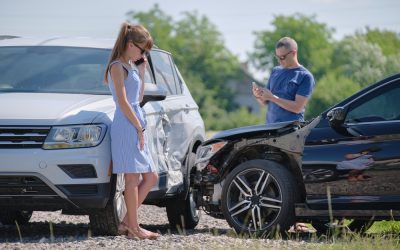
A car accident can cause tinnitus in several ways. Any injury or impact that damages your inner ear can result in tinnitus.
Our car accident lawyers in Atlanta explain how car accidents cause tinnitus and how we can leverage our legal experience to help you if you’ve been in an accident that resulted in tinnitus. Read on to learn the causes of tinnitus and what steps you should take after the accident and diagnosis.
How Does a Car Accident Cause Tinnitus?
While tinnitus can sometimes arise due to non-accident factors like noise exposure or medical conditions, car accidents also present risks for causing tinnitus through traumatic injury. Here are the most common ways a car accident can cause tinnitus:
Head or Neck Trauma
Any forceful jolt or sudden movement like whiplash has the potential to injure soft tissues or structures in the head and neck region. This includes muscles that connect to the inner ear bones responsible for hearing.
Swelling or irritation from impacts, strains, or other trauma produces abnormal signals in the ear that manifest as ringing. Even seemingly minor head contact from an unrestrained collision can cause tiny fractures or tears, leading to tinnitus over time. Prompt medical evaluation is important to rule out more serious injuries as well as manage symptoms.
Barotrauma
Rapid air pressure changes during crashes present a special risk. Events where airbags deploy with explosive force or windows break can rupture delicate eardrums. The intricate bones and fluid-filled inner ear spaces are also vulnerable to pressure shocks.
Barotrauma causes harm through blast effects rather than direct impact. As little as a 15-pound-per-square-inch overpressure threshold has the potential to damage hearing-related areas and touch off tinnitus. Seeing an ear, nose, and throat (ENT) doctor is important after any accident involving airbag deployment or pressure differential concerns.
Concussion
Even mild traumatic brain injuries from whiplash, hitting the steering wheel, or striking your head on a non-deployed airbag carry risks due to acceleration-deceleration forces. Concussions disrupt signaling patterns in the brain and lead to sensory processing abnormalities.
This can include perceptions of ringing in the ears. While tinnitus may emerge days or weeks post-injury, concussions still necessitate medical follow-up to monitor for persistent symptoms like ringing that impact quality of life.
TMJ Dysfunction
The temporomandibular joint (TMJ) connecting the jaw to the skull can become strained, inflamed, or displaced during an accident if the head or face strikes the seatbelt, steering wheel, or window. This leads to jaw pain but also puts pressure on the anatomy linking to the ear canal. Over time, TMJ issues can definitely bring on or worsen tinnitus and may need treatment from an orthodontist.
Stress and Anxiety
Even physically minor crashes naturally cause stress responses. However, the anxiety and panic associated with a traumatic event can lower the brain’s tinnitus-masking ability.
This is due to cortical and limbic system changes triggering or amplifying ear-ringing perceptions. While usually short-lived, severe post-accident distress calls for counseling to prevent chronic tinnitus development from psychological factors.
Common Symptoms of Tinnitus After a Car Accident in Atlanta
If you have experienced tinnitus or ringing in the ears as a result of a car accident in the Atlanta area, some common symptoms could develop shortly after the accident. Look out for these symptoms:
- Ringing, hissing, buzzing, or other sounds that seem to originate from inside the ears or in the head. This is the most telling symptom of tinnitus.
- Hearing sounds intermittently or constantly, with varying loudness. Tinnitus may come and go or be more persistent after an accident.
- Difficulty hearing over the tinnitus sounds, making it hard to understand speech at times. This can impact communication abilities.
- Sensitivity to loud noises that make the tinnitus worse. Loud environments may exacerbate ringing.
- Feeling dizzy, tired, or having problems concentrating due to tinnitus irritating the brain.
- Sleep disturbances from tinnitus sounds that interfere with falling or staying asleep. Lack of rest further aggravates symptoms.
- Mood changes like frustration, depression, or anxiety arise from disrupted hearing.
How Can a Car Accident Lawyer Help You Prove Your Tinnitus Is From a Car Accident?
If you developed tinnitus after a car accident and are seeking compensation, our Atlanta car accident lawyer can help prove your condition was directly caused by the crash. Our Atlanta car accident attorney will:
- Obtain your medical records documenting the onset and progression of tinnitus symptoms post-accident. Reports from ENT doctors are especially compelling.
- Hire an expert witness like an audiologist to clinically evaluate your injury and provide an expert opinion on the causal link to accident injuries.
- Review accident reports, photos, and any surveillance footage to corroborate crash details and the injury mechanism that likely triggered tinnitus.
- Pursue witness statements about the incident, and your apparent hearing/condition changes afterward.
- Cite medical literature establishing trauma as a known cause of tinnitus to argue causation to insurance adjusters or in court if needed.
- Negotiate an appropriate settlement amount that accounts for your permanent injury, treatments, and reduced quality of life due to accident-caused tinnitus.
With our legal team’s guidance in collecting evidence, it’s easier to demonstrate entitling you to fair and full compensation for tinnitus directly resulting from the negligent actions of others.
Learn About How a Car Accident Can Cause Tinnitus
After you’ve been in an Atlanta car accident, our team of lawyers can help you start building a car accident case and prove that your tinnitus is a result of the accident. Our team understands how difficult it can be after an accident, and our team is ready to help.
Contact us to learn more about how our Atlanta car accident attorneys can help you after you’ve developed tinnitus in a car crash.





